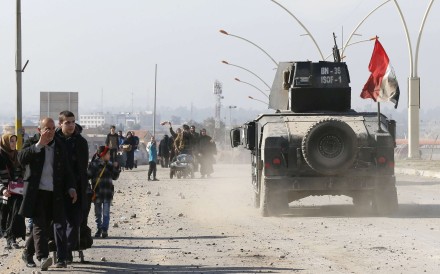US commander warns of Islamic State attacks in Asia-Pacific as jihadists go home
PUBLISHED : Thursday, 19 January, 2017, 3:28am
UPDATED : Thursday, 19 January, 2017, 3:28am
A top US military commander warned Wednesday that the Asia-Pacific region is at risk of attacks by Islamic State group fighters returning to their home countries.
As the group loses territory in the Middle East, radicalised fighters from Bangladesh, Indonesia and elsewhere are likely to target their native countries, Commander of the US Pacific Command Admiral Harry Harris said.
“It’s not a theory. It’s real. In the past year alone, ISIL has made its murderous intentions clear in places like Bangladesh, Indonesia, the Philippines, Malaysia and the United States,” he said at an geo-political conference in New Delhi.
The warning follows a similar warning from a Jakarta-based think tank in October, which said the main danger lies in the strife-torn southern Philippines where a handful of Islamic extremist groups have sworn allegiance to IS.
Southeast Asia -- parts of which have long struggled with Islamic militancy -- suffered its first IS attack in January last year when extremists launched a deadly suicide bombing and gun assault in Jakarta, leaving four attackers and four civilians dead.
IS-linked militants also killed 20 hostages in a restaurant in Bangladesh last year in one of the deadliest such incidents in the country.

Harris said India has so far successfully thwarted any such attacks at home but called for a concerted effort by the global community to deal with the threat in the region.
Nearly 60 Indians have joined the IS group since 2014 according to an official count.
Harris, who was speaking at India’s annual “Raisina Dialogue” conference attended by officials from 65 countries, also touched on the ongoing South China Sea feud, saying the US is ready to confront China on the issue of free movement in the resource-rich area.
China claims most of the South China Sea despite competing claims from the Philippines and other Asian countries.

Beijing has fuelled regional tensions by turning tiny, ecologically fragile reefs and islets in the strategically vital waterway into artificial islands hosting military facilities.
Harris urged the Asian superpower to choose the path of cooperation to maintain peace in the region.
“We will not allow the shared domains to be closed down unilaterally -- no matter how many bases are built on artificial features in the South China Sea,” he said.





No comments:
Post a Comment